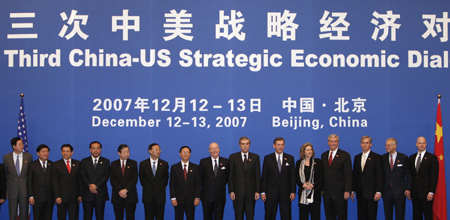Currency 'cannot be revalued' at excessive pace
Updated: 2007-12-13 07:30
XIANGHE, Hebei: China is opposed to "excessively rapid" revaluation of the yuan, a top Chinese trade official said Wednesday.
The key to resolving the trade imbalance between China and the US is to adjust the economic structure, and not to revalue the yuan, Vice-Minister of Commerce Chen Deming said during a break in the Third China-US Strategic Economic Dialogue (SED).
|
|
The key point is for China and the US to keep their currencies stable, he said.
"Since they are the world's two major economies, big swings in their currencies could mean disaster not only for them, but also for the entire world. So we should keep the currencies stable and prevent them from experiencing big swings."
Asked about whether his ministry was opposed to revaluation of the yuan, Chen said China "has never opposed, is not opposing and will not oppose the yuan's revaluation".
"What we oppose is 'excessively rapid' revaluation that doesn't conform to our national conditions," said Chen, who assumed his post less than two weeks ago. Also, a revalued yuan wouldn't necessarily reduce the trade surplus, as some expect, he said.
"Pinning hopes of reducing the trade surplus by simply revaluating the yuan is not scientific," Chen said, pointing out that China's trade surplus had actually increased dramatically since the landmark currency reform in 2005.
The trading midpoint of the yuan was at 7.3647 per dollar Wednesday, the highest since the currency was depegged from the dollar in July 2005 and shifted to a basket of currencies. The yuan has risen by 12.4 percent since then.
China and the US should tackle their trade imbalance by undertaking structural economic adjustments, Chen said.
Other policymakers and experts corroborated him. "A stronger yuan could help reduce the trade surplus but the key is to adjust the very structure of the two countries' economies," central bank governor Zhou Xiaochuan said at another media briefing on the sidelines of the SED.
"China and the US both have room for improvement in their economic restructuring," Zhou said. It's natural for the two countries to have divergent views on and approaches to tackling the economic and trade imbalance.
"Both the countries have to make their best efforts to solve the problem of trade imbalance, which is not caused by just one side," said Mei Xinyu, a researcher with a think tank, affiliated with the Ministry of Commerce. The US needs to adjust its own economic structure, too, to reduce the deficit against China."
|
|
|
||
|
||
|
|
|
|
